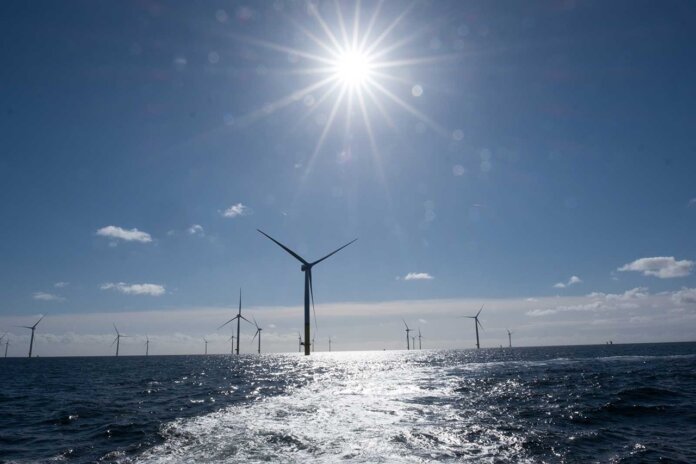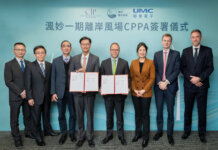RWE is participating in the Dutch offshore wind tender for Hollandse Kust West (HKW). The company has submitted bids for both HKW site VI and HKW site VII to contribute to the Dutch government’s build-out target of 21 GW for offshore wind by around 2030.
The areas are located in the North Sea, about 53 kilometers off the Dutch coast. Both sites will each deliver more than 760 MW of offshore wind capacity.
In addition, RWE’s proposed design for HKW site VI endeavors to have a positive net impact for the North Sea ecosystem, whereas RWE’s concept for HKW site VII is a blueprint for the perfect integration of offshore wind farms into the Dutch energy system, including 600 MW electrolyzer capacity onshore with access to storage capacity in the planned onshore hydrogen backbone.
“RWE is clearly committed to contribute to the Dutch government’s ambitions for offshore wind and we are pleased to have submitted our bids in the Hollandse Kust West tender,” says Sven Utermöhlen, CEO of offshore wind at RWE Renewables. “Based on our 20 years of experience in developing, constructing and operating offshore wind farms in close cooperation with the communities we are active in, we have proposed unique concepts for sites VI and VII.”
“Our design proposal for HKW VI integrates innovations to build and operate the wind farm in harmony with the North Sea ecosystem,” adds Utermöhlen. “To foster local research and businesses, we will also invest in a comprehensive R&D program on offshore wind with leading partners from the Netherlands. To unlock full system integration of offshore wind farms, our concept for HKW VII demonstrates a perfect match of supply and demand through combining offshore wind with 600 MW electrolyzer capacity for green hydrogen production, and other flexible demand solutions like e-boilers and battery storage. We are convinced that our bid will be a blueprint for developing a new generation of offshore wind farms in the North Sea and beyond.”
Offshore innovation projects are a key element of RWE’s sustainability strategy. Innovations are also an integral part of the RWE bid for HKW site VI, such that this offshore wind farm will be built and operated in harmony with the ecosystem. RWE’s design concept for HKW VI will mitigate negative effects on flora and fauna – above and below sea level – whilst taking significant steps towards rewilding the North Sea.
The company will build on its years of research at existing offshore wind farms and projects that are currently under development and construction, such as Kaskasi in the German North Sea. Innovations will be implemented to allow birds and bats to fly safely between the turbines and under the rotor swept area. Furthermore, RWE intends to rewild the area by adding artificial reefs and floating gardens. This will enhance the habitat, strengthen the food chain, and thereby benefit all species, such as birds, fish and sea mammals. Safeguarding the ecosystem is also a key issue during construction: to minimize disturbance from monopile foundation installation, RWE will make use of special vibro piling techniques.
A further key element of RWE’s bid is to drive knowledge leadership in North Sea ecology by investing in a comprehensive research and development program with leading partners. These will include universities and research institutes from the Netherlands, and will foster local research on innovations and businesses, including the creation of many new research and PhD positions. In addition, RWE envisages to set up a comprehensive multi-technology monitoring system at HKW VI; it will share knowledge to enable all stakeholders in offshore wind to do as much for ecology as possible – creating a so-called “living lab.”
In order to address the challenges arising from matching fluctuating electricity production from renewables with flexible demand for energy, RWE has developed a blueprint for the integration of offshore wind farms into the Dutch energy system. The company wants to take a big step in the system integration of offshore wind. To this end, RWE will focus on combining the HKW VII offshore wind warm with 600 MW onshore electrolyzers for green hydrogen production, supplying hydrogen and electricity to existing partners and new customers within Dutch industry.
Furthermore, the company intends to integrate e-boilers for heating, battery storage and charging solutions for electric vehicles. Large parts of the investments are planned in the Groningen and Brabant areas in close collaboration with partners in those regions. In addition, RWE also plans to accelerate the commercial application of new technologies by supporting innovators and startups in demonstrating their innovation in an operational environment.
The extensive solutions on system integration and ecology measures, research and knowledge sharing will be implemented together with more than 40 partners. This includes start-ups and innovators that RWE will support in demonstrating their innovation in an operational environment, as well as clients and industrial partners that the company will support in decarbonizing their businesses with new flexible demand investments. Furthermore, RWE will cooperate with universities, educational centers of applied science and vocational schools with regard to knowledge sharing and dissemination.




